八年级英语下册Unit 2导学案
新外研版八年级英语下册导学案Module 2-Experiences(Unit1-Unit3)
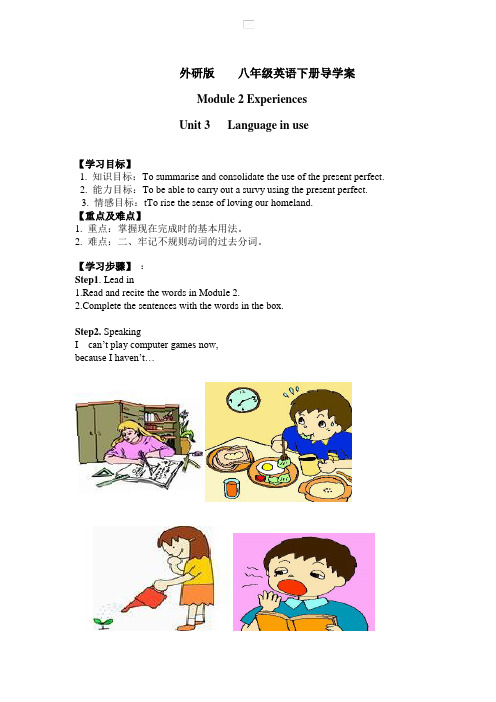
外研版八年级英语下册导学案Module 2 ExperiencesUnit 3 Language in use【学习目标】1. 知识目标:To summarise and consolidate the use of the present perfect.2. 能力目标:To be able to carry out a survy using the present perfect.3. 情感目标:tTo rise the sense of loving our homeland.【重点及难点】1. 重点:掌握现在完成时的基本用法。
2. 难点:二、牢记不规则动词的过去分词。
【学习步骤】:Step1. Lead in1.Read and recite the words in Module2.plete the sentences with the words in the box.Step2. SpeakingI can’t play computer games now,because I haven’t…Step3. Write a questionnaire about your experiences.Have you ever …had a Western meal?lived in another city?entered a singing competition?travelled by train?travelled to the seaside?tried seafood?cooked dinner for your parents?------Yes, I have. / No, I haven’t.Step4 Complete the sentences.1. He/She _____________________ a Western meal.2.He/She ______________________ in another city.3.He/She ______________________ a singing competition.4. He/She _____________________ by train.5.He/She ______________________ the seaside.6.He/She ______________________ seafood.7.He/She ______________________ for his/her parents.Step5. Complete the postcard. Use the list of Things to do in China to help you.Things to do in China!------go to Beijing,see the Beijing Opera,climb the Great Wall,eat Beijing duck,visit the Palace MuseumStep6 Activity4Dear David,I’m having a wonderful time in China. I’ve done so many things!I’ve__________________________________________________________________________________ ___________________________________________________________ There’s only one thing I haven’t don e :I...______________________________________Bye for now,RobStep7. Complete the sentences with the words in the box.afford, competition, pronounce, spell, tower1.I wrote a story for a(n) ___________ in my English class and I won a prize.2.Alice can _______ very well, and what's more, she can write beautifully.3.Some English words are difficult to ____________.4.We visited an ancient palace with a tall_______ and a beautiful garden.5.Mary wants to visit the US, but the plane tickets are very expensive and she cannot ______ to go.Step8.Listen and check (√) the correct answer.Places visitedPeople China Europe USAWinnieDianaBobStep9. Listen again and answer the questions.1. ( ) How many times has Winnie been to the US?A. two timesB. three timesC. four times2. ( ) Where would Diana like to go again?A. the USB. EnglandC. China3. ( ) Which part of China has Diana travelled around?A. NorthB. SouthC. West4. ( ) How did Diana travel there?A. by boatB. by trainC. by plane5. ( ) Has Bob ever visited Germany?A. No, he hasn’tB. Yes, he has【知识结构】(一)、Grammar现在完成时如果你想说“我已经看过某部电影,所以不想看了” “某人曾经做过什么事情”等等,该如何表达呢?首先请看下面的句子:(1)I have seen the f ilm. I don’t want to see it again.(2) Have you ever read a travel brochure?(3) I have never visited the USA.以上句子的谓语动词有一个共同的特点就是“have/has+动词的过去分词”, 用于表示在以前的某个时间曾经做过的、发生的事情,这种行为对目前有某种影响,如(1); 还可以表示到目前为止曾经经历或没经历的事情,如(2)(3)。
【最新原创】人教版八年级英语下册导学案Unit2

3) I can’t buy the bike because I have _________money
A. looked out of B. taken out of C. didn’t herun out of
4) I ______an hour and a half on my homework yesterday. A. took B. cost C. spent
8.volunteer in an after-school study program____________________________
9.hand out advertisements(ads)_________________10.建立一个食品库___________________________
B: Yeah, and we can’ t___________ making a plan. Clean-up Day is coming.
A: You’d right. Let's discuss and _____________all our ideas.
B: Well, I think we could _____________ signs.
(二)下面这些爱心活动你知道吗?请做英汉互译。看有哪些是你做过的。
1. clean up the city parks_____________________ 2. give out food at the food bank _________________
3. visit the sick kids in the hospital and cheers them up_________________________________________
外研版英语八年级下册Module 2导学案(3节)
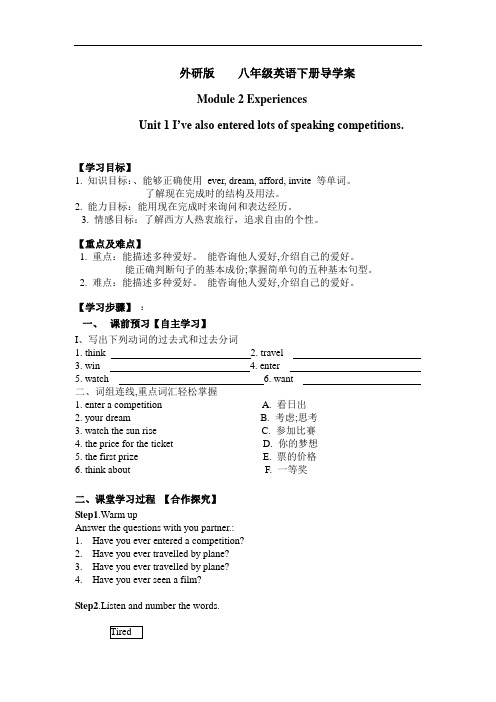
外研版八年级英语下册导学案Module 2 ExperiencesUnit 1 I’ve also entered lots of speaking competitions.【学习目标】1. 知识目标:、能够正确使用ever, dream, afford, invite 等单词。
了解现在完成时的结构及用法。
2. 能力目标:能用现在完成时来询问和表达经历。
3. 情感目标:了解西方人热衷旅行,追求自由的个性。
【重点及难点】1. 重点:能描述多种爱好。
能咨询他人爱好,介绍自己的爱好。
能正确判断句子的基本成份;掌握简单句的五种基本句型。
2. 难点:能描述多种爱好。
能咨询他人爱好,介绍自己的爱好。
【学习步骤】:一、课前预习【自主学习】I、写出下列动词的过去式和过去分词1. think2. travel3. win4. enter5. watch6. want二、词组连线,重点词汇轻松掌握1. enter a competition A. 看日出2. your dream B. 考虑;思考3. watch the sun rise C. 参加比赛4. the price for the ticket D. 你的梦想5. the first prize E. 票的价格6. think about F. 一等奖二、课堂学习过程【合作探究】Step1.Warm upAnswer the questions with you partner.:1. Have you ever entered a competition?2. Have you ever travelled by plane?3. Have you ever travelled by plane?4. Have you ever seen a film?Step2.Listen and number the words.1. Lingling has visited / hasn’t ever visited the US.2. Betty has asked / hasn’t asked her parents.3. Lingling has travelled / hasn’t travelled by plane.Step4. 读对话找出现在完成时的句子。
8年级下册英语导学案Unit2

学校:班级:小组:姓名:小组评价:教师评价:Unit 2 I’ll help to clean up the city parks.第一课时 Section A(1a-1c)【学习目标】1.会使用重点单词cheer,volunteer...,重点短语clean up,cheer up,give out...2.会使用“I could...”、“I hope to...”等句型,向别人提供协助。
3.能听懂、能说出“协助他人,参加社会公益活动”的相关话题。
【学习重难点】1.掌握cheer,volunteer...,clean up,cheer up,give out...的用法。
2.用重要句型向别人提供协助。
【学法指导】1.查词汇表,自学本课时新词汇。
2.朗读1b,勾画有用的表达:clean up,cheer up,give out,at the food bank3.互助学习,练习对话。
【自学互助】一.温故知新:和同伴议一议,讨论回答以下问题。
1.Do you think helping other is great?2.What will you do if you are a volunteer? Please give some examples.二.翻译以下短语。
1.清扫__________2.分发___________3.使快乐;振奋____________________4.sick children________________5.at the food bank__________________6.after-school study program______________________三.通过互助学习后,我的疑惑是_____________________________________________________________________________ 【展示互导】看图说,仔细听,认真评通过观察1a图片中你能够协助人们的方式,然后列出更多其他方式。
八年级英语下Unit-2-导学案
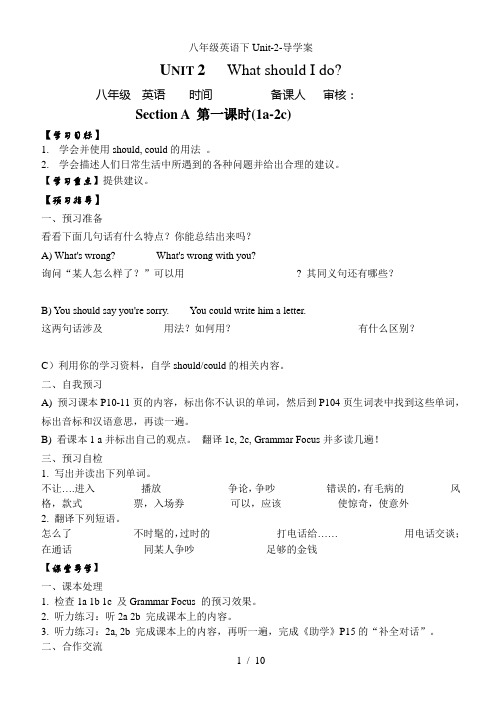
U NIT 2What should I do?八年级英语时间备课人审核:Section A 第一课时(1a-2c)【学习目标】1.学会并使用should, could的用法。
2.学会描述人们日常生活中所遇到的各种问题并给出合理的建议。
【学习重点】提供建议。
【预习指导】一、预习准备看看下面几句话有什么特点?你能总结出来吗?A) What's wrong? What's wrong with you?询问“某人怎么样了?”可以用______________________? 其同义句还有哪些?________________________________________________________________B) You should say you're sorry. You could write him a letter.这两句话涉及____________用法?如何用?________________________有什么区别?___________________________________________________________C)利用你的学习资料,自学should/could的相关内容。
二、自我预习A) 预习课本P10-11页的内容,标出你不认识的单词,然后到P104页生词表中找到这些单词,标出音标和汉语意思,再读一遍。
B) 看课本1 a并标出自己的观点。
翻译1c, 2c, Grammar Focus并多读几遍!三、预习自检1. 写出并读出下列单词。
不让….进入________ 播放___________ 争论,争吵_________ 错误的,有毛病的_______ 风格,款式________ 票,入场券_______ 可以,应该__________ 使惊奇,使意外__________ 2. 翻译下列短语。
怎么了___________ 不时髦的,过时的____________ 打电话给……_____________用电话交谈;在通话_____________ 同某人争吵______________足够的金钱___________【课堂导学】一、课本处理1. 检查1a 1b 1c 及Grammar Focus 的预习效果。
译林版英语八下unit2复习导学案

8BUnit2复习导学案一、自主复习A。
词形变化1. beautiful adj. →________ (n.) 美人,美丽2. sail v. →________ (n.) 帆船运动3. fly v. →________ (n.) 航班4. die v. →________ (adj.) 死的5. direct adj. →________ (adv.)6. indoor adj. →________ (反义词)【即时自测1】.用括号内所给词的适当形式填空1. The plane has been on ________ (fly) for half an hour.2. The dog is found ________ (die) in the doorway of a fruit shop.3. Can you feel the ________ (beautiful) of the old parks in Beijing?4. Young people usually think ________ (travel) is exciting.5. Could you tell me the answer ________ (direct)?B.词组归纳---见讲义【中考指导书】---Page99--100二、考点精讲●考点1 speed n. 速度[点拨] at a speed of…以……的速度at top speed 以最高速He drove at sixty miles an hour.他以每小时60英里的速度开车。
[拓展] speed vt.& vi. 急行,加速,超速speed up 加速slow down 减速We'd better speed up if we want to get there on time.如果我们想准时到达那里,我们最好加快速度。
●考点2 beauty n. 美人,美丽beautiful adj. 美丽的,漂亮的;beautifully adv.美丽地,完美地,出色地,很好。
八年级英语(下册)导学案unit2.
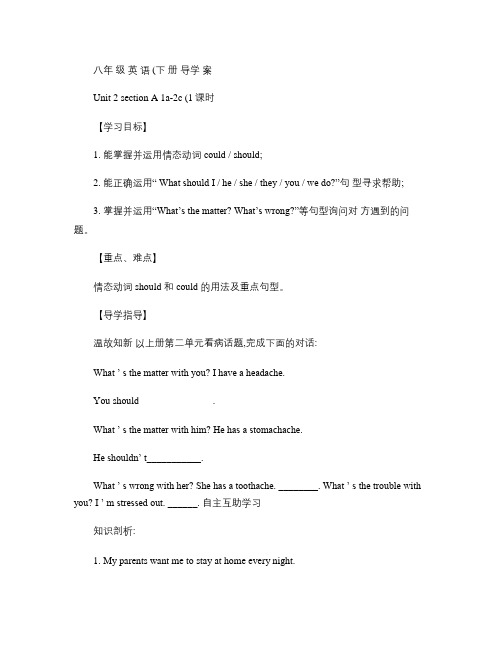
八年级英语 (下册导学案Unit 2 section A 1a-2c (1课时【学习目标】1. 能掌握并运用情态动词 could / should;2. 能正确运用“ What should I / he / she / they / you / we do?”句型寻求帮助;3. 掌握并运用“What’s the matter? What’s wrong?”等句型询问对方遇到的问题。
【重点、难点】情态动词 should 和 could 的用法及重点句型。
【导学指导】温故知新以上册第二单元看病话题,完成下面的对话:What ’ s the matter with you? I have a headache.You should_______________.What ’ s the matter with him? He has a stomachache.He shouldn’ t___________.What ’ s wrong with her? She has a toothache. ________. What ’ s the trouble wi th you? I ’ m stressed out. ______. 自主互助学习知识剖析:1. My parents want me to stay at home every night.want sb. to do sth 想要某人做某事2. My brother plays his CDs too loud.Loud, loudly, aloud均可作副词,表示“大声地”常与“ speak, talk, laugh ” ”等词连用。
1 loud 可用作形容词,有比较级、最高级;Could you speak a little louder? 你能稍微说大声点吗?2 loudly 通常表示有喧闹的意味,一般没有比较级和最高级;Everyone began to speak very loudly. 大家都开始大吵大闹。
Unit+2+Travelling+--Task导学案 牛津译林版八年级英语下册
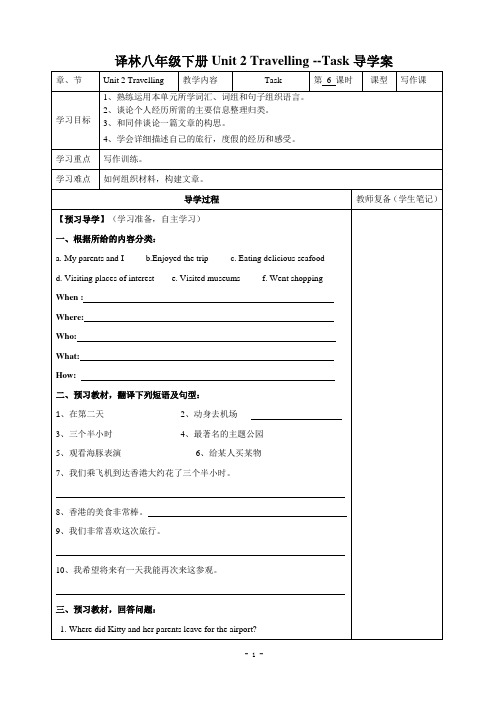
译林八年级下册Unit 2 Travelling --Task导学案章、节Unit 2 Travelling 教学内容Task 第6 课时课型写作课学习目标1、熟练运用本单元所学词汇、词组和句子组织语言。
2、谈论个人经历所需的主要信息整理归类。
3、和同伴谈论一篇文章的构思。
4、学会详细描述自己的旅行,度假的经历和感受。
学习重点写作训练。
学习难点如何组织材料,构建文章。
导学过程教师复备(学生笔记)【预习导学】(学习准备,自主学习)一、根据所给的内容分类:a.My parents and Ib.Enjoyed the tripc. Eating delicious seafoodd. Visiting places of intereste. Visited museumsf. Went shoppingWhen :Where:Who:What:How:二、预习教材,翻译下列短语及句型:1、在第二天_________________2、动身去机场3、三个半小时_______________4、最著名的主题公园__________________5、观看海豚表演_________________6、给某人买某物___________________7、我们乘飞机到达香港大约花了三个半小时。
8、香港的美食非常棒。
9、我们非常喜欢这次旅行。
10、我希望将来有一天我能再次来这参观。
三、预习教材,回答问题:1. Where did Kitty and her parents leave for the airport?______________________________________________________________ 2.How long did it take them to fly to Hong Kong?_____________________________________________________________ 3.When did they visit Ocean Park?_____________________________________________________________ 4.Where did they visit on the fourth day?_____________________________________________________________ 四、预习教材32页Part A 部分, 完成33页Part B .The day finally arrived. My parents and I left for the airport in the early morning. It took us about three and a half hours to fly to Hong Kong.The next day, we went to the most famous theme park–-(1).I loved watching the interesting (2)of Disney characters and the Space Mountain ride was every (3)..On the third day, we visited another famous theme park in Hong Kong –(4).We watched the (5)and the bird show there. They were great fun.On the fourth day, we visited some museum, and then we went (6). My mother enjoyed that day most. She bought a lot of presents for our relatives and her friends.We went to a seafood restaurant on the fifth day and had a (7)meal. The food in Hong Kong was really nice.We enjoyed this trip very much and I hope I can visit it again some day.【课堂导学】(老师指导,掌握方法)Task 1 Learn by yourselfLook at Kitty’s fact file-Part A on P32 carefully and try to remember more information about Kitty’s trip to HongKong.Task 2 Checking workSs check the answers of Part B together on P33.Task 3 Work in groups(小组合作探究,具体分析文章的结构)We can divide Kitty’s article into parts:Part 1: Para( ) It is mainly aboutPart 2: Para( )—Para( ) It is mainly about①②③④Part 3: para( ) It is mainly aboutTask4 Find out the adv. and adj. That Kitty used to describe her article.adv:adj:Task5 Writing in class(课堂作文,学会仿写)假设你叫李华,上周末你和同学乘动车到桂林进行了一次两天的短途旅行。
2020年春人教新目标英语八年级下册Unit-2全单元导学案(无答案)
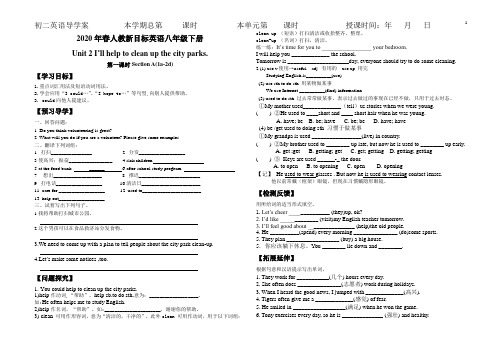
2020年春人教新目标英语八年级下册Unit 2 I’ll help to clean up the city parks.第一课时Section A(1a-2d)【学习目标】1.重点词汇用法及短语动词用法。
2.学会应用“I could…”、“I hope to…”等句型,向别人提供帮助。
3. could向他人提建议。
【预习导学】一、回答问题:1. Do you think volunteering is great?2. What will you do if you are a volunteer? Please give some examples.二、翻译下列词组:1. 打扫________________2. 分发__________________3.使高兴;振奋_________________4.sick children5.at the food bank ______6.after-school study program7.想出___________________ 8. 推迟________________________9. 打电话__________________ 10.清洁日_______________________11. care for __________________ 12. used to_______________________13. help out__________________三、试着写出下列句子。
1.我将帮助打扫城市公园。
2.这个男孩可以在食品救济站分发食物。
3.We need to come up with a plan to tell people about the city park clean-up.4.Let’s make some notices ,too.【问题探究】1. You could help to clean up the city parks.1)help作动词,“帮助”。
八年级英语下册unit2whatshouldido导学案

Unit 2 What should I do?Section A (1a-2c)预习案Ⅰ预习导学一、词汇精粹学习建议从课本1a-2c中找出下列单词、短语。
1. 播放2. 争吵;争论3. keep out4. 错误的5. style6.票;入场券7.使惊奇 8.could 9. out ofstyle10. call sb. up 11. 用电话交谈二、听力内容预测(一)牢记P10-P11出现的生词,扫清听力障碍。
(二)观察1a上面的图片和下面的句子,大胆预测:1. What’s the girl thinking in the picture on the top left corner(左上角)?2. What does another girl suggest(建议)to her?3. Should she argue with her parents?三、语法聚焦翻译下列句子。
1.“What’s wrong?”“My clothes are out of style.”2.“What should I do?”“You should say you’re sorry.”3.“What should he do?”“Maybe he should write her a letter.”看一看:1.找出例句1的问句同义句。
2.以上句子中是用哪个单词提建议的,哪一个副词使建议的语气更加委婉?3.将例句2的答语变为否定句。
Ⅱ预习自测一、词汇精粹1. We must have a to watch a movie.2. It’s rude to with others when you have different opinions.3. My son gave me some flowers on Mother’s Day. It really (使惊奇)me.4. The word means“not right”. It is “”5. When a coat is not fashionable,we call it .二、语法聚焦将下列对话搭配起来。
新人教版八年级英语下册Unit2 Period2导学案
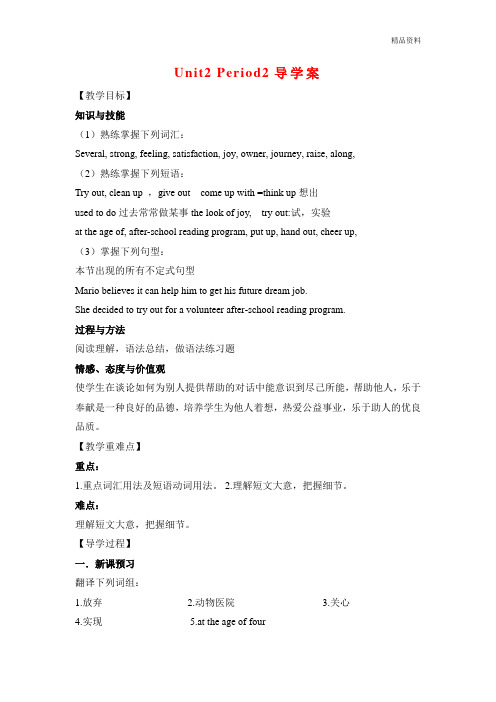
Unit2 Period2导学案【教学目标】知识与技能(1)熟练掌握下列词汇:Several, strong, feeling, satisfaction, joy, owner, journey, raise, along,(2)熟练掌握下列短语:Try out, clean up ,give out come up with =think up 想出used to do过去常常做某事the look of joy, try out:试,实验at the age of, after-school reading program, put up, hand out, cheer up,(3)掌握下列句型:本节出现的所有不定式句型Mario believes it can help him to get his future dream job.She decided to try out for a volunteer after-school reading program.过程与方法阅读理解,语法总结,做语法练习题情感、态度与价值观使学生在谈论如何为别人提供帮助的对话中能意识到尽己所能,帮助他人,乐于奉献是一种良好的品德,培养学生为他人着想,热爱公益事业,乐于助人的优良品质。
【教学重难点】重点:1.重点词汇用法及短语动词用法。
2.理解短文大意,把握细节。
难点:理解短文大意,把握细节。
【导学过程】一.新课预习翻译下列词组:1.放弃______________2.动物医院________________3.关心____________4.实现______________5.at the age of four________________6.try out for ______________7.after-school reading program __________________8.张贴____________9.分发______________ 10.打电话________________ 11.使振奋__________ 12.想出_______________ 13.捐赠 ________________ 14.推迟 ____________ 15.闲暇时间____________ 16.考虑__________________ 17.制定计划_____________ 18.无家可归的人______________20.停止做某事 _______________二. 情景导入复习上节课内容,角色扮演2d部分。
人教版八年级英语下册unit 2(2)导学案
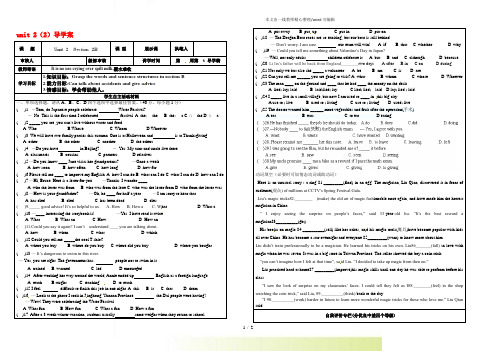
unit 2(2)导学案课题课型展示课执笔人审核人级部审核讲学时间第周第 6 导学稿教师寄语It is no use crying over spilt milk.覆水难收学习目标1.知识目标:Grasp the words and sentence structures in section B2.能力目标:Can talk about accidents and give advice3.情感目标:学会帮助他人。
学生自主活动材料一、单项选择题,请从A、B、C、D四个选项中选择最佳答案。
(40分,每小题1分)( )1. -Tom, do Japanese people celebrate Water Festival?-No. This is the first time I celebrated festival. A. the;the B. the;a C. /;the D. /;a ( )2._____ you are ,you can’t live without water and food.A. WhoB.WhoseC. WhomD.Whoever( )3. We will have two family parties this autumn. One is at Halloween and is at Thanksgiving.A. otherB. the otherC. anotherD. the others( )4. -Do you have in Beijing?-Yes. My aunt and uncle live there.A. classmatesB. cousinsC. partnersD.relatives( )5.—Do you know ____ Jane visits her grandparents? —Once a week.A. how soonB. how oftenC. how longD. how far( )6.Please tell me ____ to improve my English. A. how I can do B. what can I do C. what I can do D. how can I do ( )7.—Hi, Bruce. Here is a letter for you. —Thanks. I wonder ____.A. who the letter was fromB. who was from the letteC. who was the letter fromD. who from the letter was ( )8.—How is your grandfather? —Oh, he ____ for half a year. —I am sorry to hear that.A. has diedB. diedC. has been deadD. dies( )9._____ good advice! It’s so helpful to us. A. How B. How a C. W hat D. What a ( )10.—____ interesting the storybook is! —Yes. I have read it twice.A. WhatB. What anC. HowD. How an( )11.Could you say it again? I can’t understand ____ you are talking about.A. howB. whenC. whatD. which( )12.Could you tell me _____the cool T-shirt?A. where you buyB. where do you buyC. where did you buyD. where you bought ( )13.—It’s dangerous to swim in this river.— Yes, you are right. The government has people not to swim in it.A. trainedB. w arnedC. ledD. encouraged( )14.. After working her way around the world, Annie ended up English as a foreign language.A. teachB.taughtC. teachingD. to teach( )15.I feel difficult to finish this job in one night. A. this B. it C. that D. them( )16. — Look at the photo I took in J inghong, Yunnan Province. the Dai people were having!— Wow! They were celebrating the Water Festival.A. What funB. How funC. What a funD. How a fun( )17. After a 3-week winter vacation, students usually some weight when they return to school.A. put awayB. put upC. put inD. put on( )18. — The Dragon Boat races are so exciting, but our boat is still behind.—Don’t worry. I am sure our team will win! A. if B. that C. whether D. why ( )19. —Could you tell me something about Valentine’s Day in Japan?— Well, not only adults children celebrate it. A. but B. and C. although D. because ( )20.Li lin’s father will be back from England________two days. A.after B.in C.on D.during ( )21.Not only we but also she _____ a volunteer. A. be B. am C. is D. are( )22.Can you tell me ______ you are going to visit? A. what B. whom C. whose D. Whoever ( )23.The man ____ on the ground and ____ that he had ____ the money on the desk.A. lied; lay; laidB. laid;lied; layC.lied; lied; laidy; lied ; laid( )24.I _____ live in a small village, but now I am used to ____ in this big city.A use to ; live B. used to ; living C. use to ; living D. used; live( )25.The doctor warned him ______ more vegetables and fruit after the operation(手术).A.eatB. eatsC. to eatD.eating动词填空(必要时可加情态动词或助动词)Here is an unusual story : a ring 81._________(find) in an egg. The magician, Liu Qian, discovered it in front of audience(观众) of millions at CCTV’s Spring Festival Gala.Liu’s magic tricks82.________ (make) the old art of magic fash ionable once again, and have made him the hottest magician in China.“ I enjoy seeing the surprise on people’s faces,” said 33-year-old liu. “It’s the best reward a magician83__________(get).His boo ks on magic 84.__________(sell) like hot cakes, an d his magic tools(魔具)have become popular with kids all over China. He has become a star overnight and everyone 85_________(want) to know more about him.Liu didn’t train professionally to be a magician. He learned his tricks on his own. Liu86_______(fall) i n love with magic when he was seven. It was in a big store in Taiwan Province. The seller showed the boy a coin trick.“you can’t imagine how I felt at that time”, sa id Liu. “I decided to take up magic from then on.”Liu practiced hard at home87._________(improve)his magic skills until one day he was able to perform before his class.“I saw the look of surprise on my classmates’ faces. I could tell they felt as I88.________(feel) in the shop watching the coin trick,” said Liu, 89.__________(think) back to the day.“I 90.__________(work) harder in future to learn more wonderful magic tricks for these who love me.” Liu Qian said.自我评价专栏(分优良中差四个等级)自主学习:合作与交流:书写:综合:教学反思:。
新人教版八年级英语下册Unit2 Period1导学案
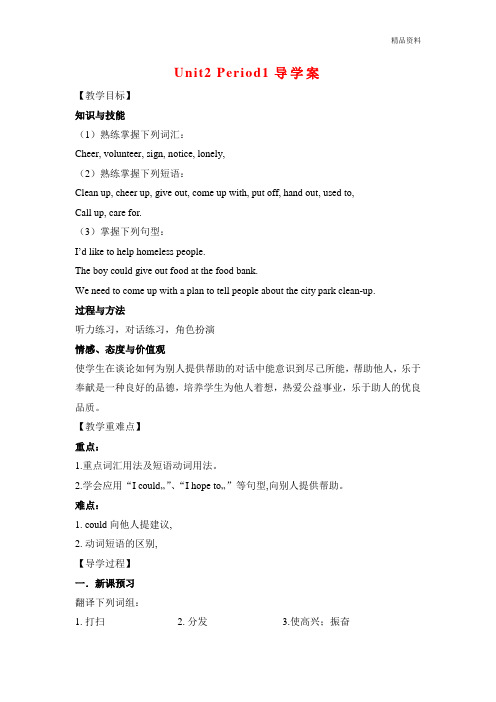
Unit2 Period1导学案【教学目标】知识与技能(1)熟练掌握下列词汇:Cheer, volunteer, sign, notice, lonely,(2)熟练掌握下列短语:Clean up, cheer up, give out, come up with, put off, hand out, used to,Call up, care for.(3)掌握下列句型:I’d like to help homeless people.The boy could give out food at the food bank.We need to come up with a plan to tell people about the city park clean-up.过程与方法听力练习,对话练习,角色扮演情感、态度与价值观使学生在谈论如何为别人提供帮助的对话中能意识到尽己所能,帮助他人,乐于奉献是一种良好的品德,培养学生为他人着想,热爱公益事业,乐于助人的优良品质。
【教学重难点】重点:1.重点词汇用法及短语动词用法。
2.学会应用“I could…”、“I hope to…”等句型,向别人提供帮助。
难点:1. could向他人提建议,2. 动词短语的区别,【导学过程】一.新课预习翻译下列词组:1. 打扫________2. 分发_____________3.使高兴;振奋___________4.sick children ___________5.at the food bank ____________6.after-school study program ______________7. 想出______________8. 推迟_______________9. 张贴_______________ 10. 分发______________ 11.打电话____________ 12.清洁日_____________13. care for ______________14. used to______________ 15. help out____________二. 情景导入展示几张需要帮助的人或事的图片。
最新人教版八年级下册英语Unit2第二单元导学案

①put up _______________②call up_______________③cheer up_____________
④comeup with _______________⑤put off_______________
⑥hand out_______________⑦give out_______________
【解析】take after意为“(在外貌、性格等方面)与(父母等)相像”,不能用于进行时态。
例:Mary takes after her father.译为____________________________
妙辨异同:
take after
指由于血缘关系而在外貌、性格等方面相似。
look after
【解析】lonely是形容词,意为______________________。
【课后作业】
1.—Do you feel ________ (alone/lonely) when your parents aren’t home?
—Not at all. I can read books or play the piano.
人教版八年级下册英语Unit2第二单元导学案
导学案
年级
科目
学年度
审核人
执笔人
姓名
教学内容
Unit 2I’ll help to clean up the city parks.
课前教学思路设计(手写)l
Unit 2I’ll help to clean up the city parks.
Section A 1a - 2d
功能
意义
修饰可数名词复数
修饰不可数名词
人教版八年级下册Unit2单元知识点导学案
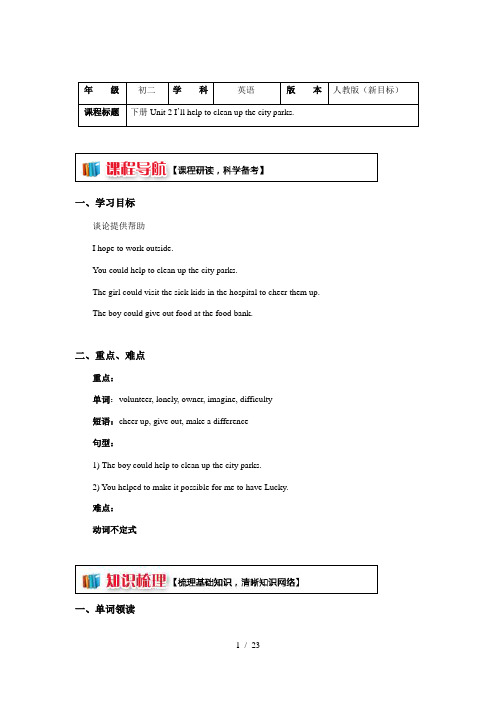
年级初二学科英语版本人教版(新目标)课程标题下册Unit 2 I’ll help to clean up the city parks.一、学习目标谈论提供帮助I hope to work outside.You could help to clean up the city parks.The girl could visit the sick kids in the hospital to cheer them up.The boy could give out food at the food bank.二、重点、难点重点:单词:volunteer, lonely, owner, imagine, difficulty短语:cheer up, give out, make a difference句型:1) The boy could help to clean up the city parks.2) You helped to make it possible for me to have Lucky.难点:动词不定式一、单词领读city n. 都市;城市volunteer v. & n. 义务做;自愿做;志愿者notice n. 公告牌;通告;布告lonely adj. 孤独的;寂寞的several pron. 几个;数个;一些feeling n. 感觉;感触satisfaction n. 满足;满意joy n. 高兴;愉快owner n. 物主;主人journey n. (尤指长途)旅行;行程sick adj. 生病的;有病的raise v. 募集;征集alone adv. 独自地;单独地repair v. 修理;修补fix v. 安装;使固定wheel n. 车轮;轮子letter n. 信;函miss n. 女士;小姐blind adj. 瞎的;失明的deaf adj. 聋的imagine v. & n. 想象;设想difficulty n. 困难;难题open v. 开;打开door n. 门carry v. 拿;提;扛train v. 训练;培训excited adj. 激动的;兴奋的training n. 训练;培训kindness n. 仁慈;善良clever adj. 聪明的understand v. 理解;领会change v. 变化;改变strong adj. 强壮的;强健的disabled adj. 丧失能力的;有残疾的sir n. 先生madam n. 夫人;女士二、重点单词【单词学习】1. volunteer v. 义务做;自愿做;n. 志愿者【用法】作动词时常构成短语:volunteer to do sth. 自愿做某事【例句】The boy volunteered to help me with the housework. 这男孩自愿帮我做家务。
人教版八年级英语下册Unit2(1)导学案
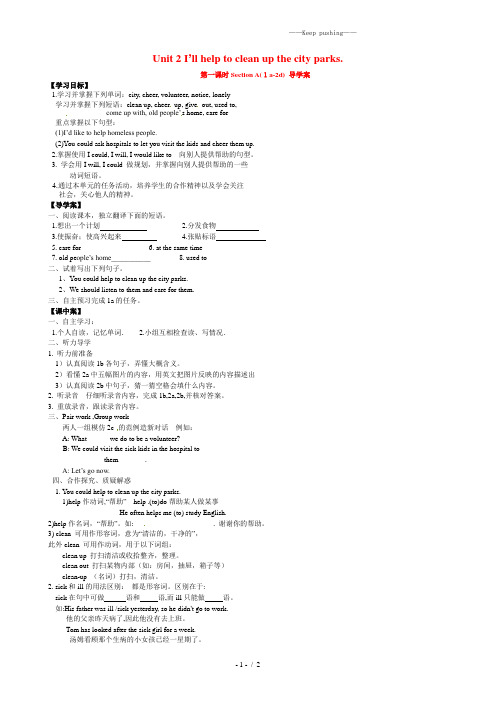
Unit 2 I’ll help to clean up the city parks.第一课时Section A(1a-2d) 导学案【学习目标】1.学习并掌握下列单词:city, cheer, volunteer, notice, lonely学习并掌握下列短语:clean up, cheer up, give out, used to,come up with, old people’s home, care for重点掌握以下句型:(1)I’d like to help homeless people.(2)You could ask hospitals to let you visit the kids and cheer them up.2.掌握使用I could, I will, I would like to 向别人提供帮助的句型。
3. 学会用I will, I could 做规划,并掌握向别人提供帮助的一些动词短语。
4.通过本单元的任务活动,培养学生的合作精神以及学会关注社会,关心他人的精神。
【导学案】一、阅读课本,独立翻译下面的短语。
1.想出一个计划2.分发食物3.使振奋;使高兴起来4.张贴标语5. care for_______________6. at the same time________________7. old pe ople’s home___________ 8. used to_____________二、试着写出下列句子。
1、You could help to clean up the city parks.2、We should listen to them and care for them.三、自主预习完成1a的任务。
【课中案】一、自主学习:1.个人自读,记忆单词.2.小组互相检查读、写情况.二、听力导学1. 听力前准备1)认真阅读1b各句子,弄懂大概含义。
- 1、下载文档前请自行甄别文档内容的完整性,平台不提供额外的编辑、内容补充、找答案等附加服务。
- 2、"仅部分预览"的文档,不可在线预览部分如存在完整性等问题,可反馈申请退款(可完整预览的文档不适用该条件!)。
- 3、如文档侵犯您的权益,请联系客服反馈,我们会尽快为您处理(人工客服工作时间:9:00-18:30)。
Unit 2 .What should I do?Section A一.认定目标:知识与能力:学会如何谈论问题并提出解决问题的建议,谈谈个人的观点。
过程与方法:从谈论学生生活的问题导入,提出一些大家关心的问题,并让学生各抒己见,提出一些解决问题的建议,进行大量的课堂口语交际。
情感、态度与价值观:学生课堂Pairwork 和Groupwork的活动,是培养他们团结协作精神的途径。
让学生能与他们和谐地交流与真诚地合作,这是他们能立足于未来社会的一种良好的个性品质。
同时,通过学生针对问题而提出合理的建议,这对他们本人也非常有益,如果他们在自己的实际生活中遇到类似的问题,就会很理智地去处理。
教学重点:要求学生学会运用情态动词should、could、shouldn't:;学会使用What should I do? You shouldn't| You shouldn't句型。
教学难点:运用基本句型提建议。
二、预习检测『汉译英』1.不许进入 __________________2.过时的 ________________________3.怎么了? __________________4.打电话给某人____________________5.付钱 _______________________6.好主意 _________________________7.索要某物___________________ 8.呆在家里 _______________________9.夏令营 ________________ 10.一张球赛的门票 ___________________三、共同探究(1) Look at these problems. Are they serious or not? Write them in the appropriate box.{Finish 1 a(2) Listen to the tape. Then finish 1b, 2a, 2b(3) Read the conversation. What do you think of the advice? Next to each suggestion, write"good idea","okay idea"or “bad idea". {Finish 3a}(4) PAIRWORK :Student A gives advice about getting more money. Student B says if the ideas are good, okay or b ad.四、归纳整理:『重点语法』1.keep:(1)keep out 不让..... 进步(2)keep off 远离,不接近(3)keep on 继续进行,继续下去2.argue: argue with sb.(about/over sth.) 与某人争论(某事)3. style :(1)out of style 不时髦的;过时的(2) in style 时髦的;流行的4. What's wrong?常用于询问某人或某物怎么了,也是医生询问病人情况的常用语。
后面可接 with sb./sth.表示“某人/某物怎么了”。
同义句:What's the matter? 或What's the trouble?5. call:(1)call sb.up 打电话给----- (2) call on 拜访;号召(3) call for 需求;要求6. surprised:(1)be surprised at sth. 对——感到惊奇 (2) be surprised to do sth.惊讶于做------ (3) in surprised 惊奇地 (4) to one's surprise 使某人吃惊的是7.pay:pay for---- "付-----帐;付买-------的钱”,常用于"pay+钱+for+sth."结构,表示"花钱购买某物”;还可用于"pay+sth.+for+钱"表示"卖某物得款",但其主语都应是人。
8.buy sth.for sb.为某人购买某物。
9.get sb.to do sth."让某人做某事“。
五、扩展练习(1)根据句意及汉语提示补全单词。
st night my brother ________ (播放) hia CDs too loud.2. I want five _________ (票) to the football game,please.3. The result of the exam ________ (使意外) everyone.4. Sally can't speak Chinese. Her parents can't , ________ (也).5. There is something ________(有毛病的) with my computer.(2) 翻译句子。
1.电视声音开得太大了,能调小一点吗?The TV is too loud. Could you please ________ _______ _______?2.我很喜欢这部MP4,但我没有足够的钱。
I like this MP4 very much ,but I have not ________ _________.3.你为什么和吉姆吵架?Why did you ________ _________ Jim?4.你妈妈很担心你。
你应该马上给她打电话。
Your mother is worried about you. You should ______ her ______ right away.5.我们应当给他写信。
We should _______ a letter _______ him.(3) 单项选择。
1. I don't like to ______ it ______ the phone.A. talk about ;onB. say ;inC. speak;onD.read about;on2. If you are wrong,you should ______ sorry ______ others.A. talk; toB. say;toC. speak ;aboutD. say;for3.Don't argue _______ your parents. It's not polite.A. toB. forC. withD. in4. The building is ________.A. high enoughB. enough highC. enough highlyD. highly enough5. I need some money to ______ for summer camp.A.payB.spendC. costD.take6.I'm sorry I can't find the library book.I'm afraid you have to ______ it.A. send forB. call forC. pay forD.wait for7. What he said _________ me.A. are surprisedB. are surprised atC. are surprised withD. surprised8. Our teachers want us ______ at school on Mondays.A. stayB. to stayC. stayingD. stayed9. Yesterday Anny argued ________ Li Lei ______ it.A. to; aboutB. with; aboutC. about; withD. at; with10. I need some money. What ________ I do?A. shouldB. shallC. mustD. can(4)句型转换。
1.What's wrong with your grandma?(改为同义句)What's ________ ________ with your grandma?2. Why don't you buy her an MP4?(改为同义句)Why _____ buy an MP4 _______ her?3. Her coat is out of style.( 改为同义句)Her coat is not _______ _______.4. Tony will go to the party,too.(改为否定句)Tony _______ go to the party,________.5. We should write him a letter this week.(改为同义句)We should ________ ________ him this week.{自主、互助、高效课堂导学案}Unit 2 .What should I do?Section B一.认定目标:知识与能力:学习一些有关服饰方面的常用词汇;学习应用文体 ------- 信件的格式与写作。
过程与方法:课堂上以听力训练为辅助,倡导学生主动参与,两、三个人分成一组,随意性地进行口语交际,谈论某个问题,相互交换意见。
情感、态度与价值观古人说“良药苦口利于病,忠言逆耳利于行”,培养那种请求别人帮助、并虚心听取他人建议的良好的个性品质。
教学重点:掌握一些重要词汇。
教学难点:学会谈论问题,并能提出书面建议。
二、预习检测『汉译英』1.与……同样的____________________2.衣服和发型__________________3.在学校 ________________________4.我最好的朋友_________________5.邀请我_______________________6.上体育课 _____________________7.了解;查明;发现________________ 8.不同样式的衣服________________三、共同探究(1) When you choose clothes, what is important to you?Next to each statement. write NI (for not important). I (for important) or VI (for very important). {finish 1a}(2) Listen to the tape. {finish 2a and 2b}(3) Read this letter to a newspaper advice column. Underline the problem. {finish 3b}.四、课堂练习(1)用括号中所给词的适当形式填空(一空一词)。
